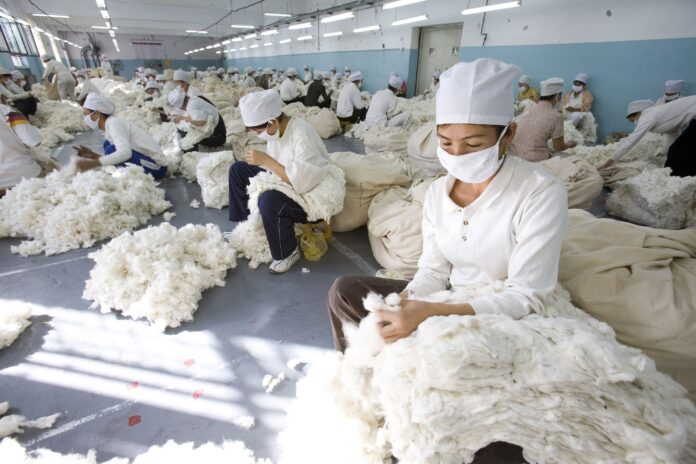China is forcing hundreds of thousands of Uighurs and other minorities into hard, manual labour in the vast cotton fields of its western region of Xinjiang, according to a report by the BBC.
The Xinjiang region produces more than 20pc of the world’s cotton and 85pc of China’s, but according to a new report released on Tuesday by the Center for Global Policy (CGP), there is significant evidence that it is “tainted” by human rights abuses, including suspected forced labour of Uighur and other Turkic Muslim minority people.
The revelations came as the International Criminal Court (ICC) said it did not have the jurisdiction to investigate allegations of crimes against humanity and genocide in Xinjiang.
According to the BBC’s findings, over half a million Chinese religious minorities are suspected of being detained in detention camps where they are forced to participate in textile related work alongside constant “thought training”.
The Chinese government denies the claims, insisting that the camps are “vocational training schools” and the factories are part of a massive, and voluntary, “poverty alleviation” scheme. But the new evidence suggests that upwards of half a million minority workers a year are also being marshalled into seasonal cotton picking under conditions that again appear to raise a high risk of coercion, the report states.
Victims of Communism Memorial Foundation Senior Fellow Dr Adrian Zenz, who uncovered the documents, told the BBC that new “evidence of Uighur forced labour in manufacturing, in garment making, directly about the picking of cotton, could be a game-changer.”
Dr Zenz’ statement is supported by multiple satellite images, online government policy papers and state news reports providing evidence on sudden huge industrial expansion, dubious movement of people.
The report explains that in 2018, the prefectures of Aksu and Hotan sent 210,000 workers “via labour transfer” to pick cotton for a Chinese paramilitary organisation, the Xinjiang Production and Construction Corps.
This year, Aksu identified a need for 142,700 workers for its own fields, which was largely met through the principle of “transferring all those who should be transferred.” References to “guiding” the pickers to “consciously resist illegal religious activities” indicate that the policies are designed predominantly for Xinjiang’s Uighurs and other traditionally Muslim groups.
China’s mass relocation of its rural poor as part of a national anti-poverty campaign has revved up in the past four to six years following what Bejing claims as radical Islamist attacks.
Since 2018, a huge industrial expansion has been under way involving the building of hundreds of factories. The parallel purpose of mass employment and mass imprisonment is made clear by the appearance of many factories within the walls of the camps, or in close proximity to them, the report adds.
The report further raises questions over the living conditions and daily lives of the textile workers, saying that “It is impossible to verify who the people in the satellite image are or what the conditions for the workers in the facility are like today; however, recent findings have claimed that the detainees are put through short bouts of “military-style” job training by the Chinese, who according to a report found by Dr Zenz wish to transform the “deep-rooted, lazy thinking” of poor, rural villagers by showing them that “labour is glorious”.
A policy document from Aksu, dated October this year, decrees that cotton pickers must be transported in groups and accompanied by officials who “eat, live, study and work with them, actively implementing thought education during cotton picking”.
A young Uighur who has taken asylum in Europe told BBC that his sister was taken to a textile factory in Aksu where she was made to work but not paid for three months.
“People go because they’re afraid of being taken to jail or somewhere else.”
Furthermore, the report examines Xinjiang’s cotton growing industry which was dependent on seasonal, migrant workers from other provinces in the country, whose interest in the work has fast diminished, leading to a dearth of local labour.
“There is no mention of real explanation of why hundreds of thousands of people, who apparently had no previous interest in picking cotton, should suddenly rush into the fields,” the report emphasises.
In response to questions submitted to China’s foreign ministry, the BBC received a faxed statement saying: “Workers from all ethnic groups in Xinjiang choose their jobs according to their own free will and sign voluntary employment contracts in accordance with the law.”
And it dismissed accusations of forced labour as “completely fabricated”, saying instead that China’s critics wanted to cause “forced unemployment and forced poverty” in Xinjiang.
“The smiling faces of all of Xinjiang’s ethnic groups are the most powerful response to America’s lies and rumours,” it added.
Earlier, in the first week of December, the United States’ Customs and Border Protection (CBP) personnel issued a detention order on cotton products made by Xinjiang Production and Construction Corps (XPCC) for using prison labour. The CBP order contended that cotton products made by XPCC used forced labour.
It may be mentioned here that India could exploit the ban to find more convergence with the US and also attack China economically.




